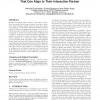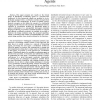622 search results - page 34 / 125 » The Agent Modeling Language (AMOLA) |
ATAL
2010
Springer
13 years 10 months ago
2010
Springer
Speakers in dialogue tend to adapt to each other by starting to use similar lexical items, syntactic structures, or gestures. This behaviour, called alignment, may serve important...
TASE
2012
IEEE
12 years 4 months ago
2012
IEEE
— This paper presents new results on the formal design of distributed coordinating agents in a discrete-event framework. In this framework, agents are modeled to be individually ...
ATAL
2006
Springer
14 years 25 days ago
2006
Springer
The modular representation of concerns is imperative in the design modeling of multi-agent systems (MASs). However, MAS designers typically face a number of concerns that inherent...
CORR
2006
Springer
13 years 9 months ago
2006
Springer
It is well known that perspective alignment plays a major role in the planning and interpretation of spatial language. In order to understand the role of perspective alignment and...
LADS
2007
Springer
14 years 3 months ago
2007
Springer
Programming languages based on the BDI style of agent model are now common. Within these there appears to be some, limited, agreement on the core functionality of agents. However, ...


